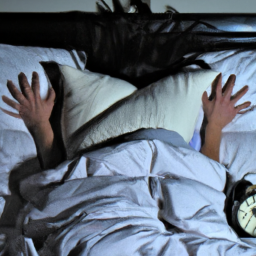Have you ever been startled awake by a nightmare and wondered why your dreams are so stressful? That’s something I can relate to. Having dreams where you’re being chased, falling off a cliff, or failing a test can be terrifying, leading to feelings of anxiety and stress that stick with you even after you wake up. But have you ever stopped to consider why this happens?
Our dreams are complex and mysterious, often reflecting our subconscious thoughts and emotions. They serve a purpose in helping us process information and emotions from our waking lives. However, sometimes they can become overwhelming with stress and anxiety, leading to restless nights and feelings of exhaustion the next day.
In this article, we will explore some common reasons for why our dreams may be so stressful and what we can do about it.
Key Takeaways
- Dreams reflect subconscious thoughts and emotions, and can reveal stress and anxiety from waking life.
- Sleep disorders like insomnia and sleep apnea intensify dream intensity, making them more vivid and intense.
- Mindfulness practices like meditation and deep breathing exercises can manage stress and improve sleep and dream quality.
- Seeking professional help from mental health professionals trained in dream analysis and therapy can provide relief from recurring nightmares and a better understanding of one’s own psyche.
The Purpose of Dreams and How They Work
Did you know that dreams are your brain’s way of processing emotions and memories while you sleep? It’s pretty fascinating how they work!
The science behind dreaming is complex, but researchers have found that during the REM (rapid eye movement) stage of sleep, the brain is highly active and we experience vivid dreams. Dreams can be influenced by our waking life experiences, as well as our emotional state. They can be a reflection of our fears, hopes or desires.
There are also many misconceptions about dreams. Some people believe that they only dream in black and white, while others think that their dreams have no meaning at all. However, studies have shown that everyone dreams in color and that there is often a deeper psychological significance to our dream content.
By understanding the purpose of dreaming and how it works, we can better understand ourselves and potentially reduce stress and anxiety in our waking lives.
Stress and Anxiety in Our Waking Lives
I’ve noticed that my dreams can be especially intense and stressful when I’m going through a particularly stressful time in my waking life.
It’s not uncommon for stress and anxiety to manifest themselves in our dreams, as they often reflect our subconscious concerns and fears.
However, there are ways to manage this connection between waking stress and dream intensity, such as practicing relaxation techniques or seeking professional help if needed.
The Connection Between Stress and Dream Intensity
When feeling stressed, our dreams can become intense and overwhelming, leaving us feeling anxious and exhausted upon waking. The connection between stress and dream intensity has been extensively studied by psychologists and sleep experts. Dream interpretation techniques have shown that external factors such as work-related stress, financial worries, or relationship problems can significantly impact the vividness and frequency of our dreams.
According to a study conducted by the University of Turku in Finland, people experiencing high levels of psychological distress reported having more frequent nightmares than those who were less stressed. In addition to this, stressful events such as trauma or grief can cause recurring dreams that relive the experience over and over again. It is believed that during sleep, our brains try to process emotions from events that occurred during the day, leading to heightened dream activity when we are under significant emotional pressure. Understanding these connections between stress and dream intensity can help us find ways to manage our stress levels effectively so that we can achieve better quality sleep without being disrupted by anxiety-inducing dreams.
To manage stress and anxiety effectively, it’s essential to identify the root causes of your worries. By keeping a journal or talking with a trusted friend or therapist about your thoughts and feelings before bed, you may be able to reduce your overall level of stress before entering into restful slumber. Engaging in mindfulness practices such as meditation or deep breathing exercises may also help calm an overactive mind before bedtime. Ultimately, finding healthy ways to manage stress will not only lead to better quality sleep but also improve overall well-being in daily life.
How to Manage Stress and Anxiety
To effectively manage stress and anxiety, I believe it’s crucial to first identify the root causes of our worries. This can involve some introspection and self-awareness, as well as seeking support from trusted friends or professionals.
Once we have a better understanding of what triggers our stress and anxiety, we can begin implementing healthy coping mechanisms. Here are three strategies that have been shown to help manage stress and anxiety:
- Mindfulness practices such as meditation or deep breathing exercises can help us stay present in the moment and reduce feelings of overwhelm.
- Cognitive Behavioral Therapy (CBT) is a type of therapy that focuses on changing negative thought patterns and behaviors that contribute to stress and anxiety.
- Exercise and diet changes can also play a role in managing stress. Regular physical activity has been shown to boost mood, while foods rich in omega-3 fatty acids (such as salmon or chia seeds) may help reduce inflammation linked to stress.
Incorporating these strategies into our daily routine can go a long way in managing stress and anxiety levels. However, for those who’ve experienced trauma or PTSD, additional support may be necessary.
Trauma and PTSD
You may be experiencing stressful dreams due to unresolved trauma or PTSD. Traumatic events can leave a lasting impact on our minds, emotions, and even our physical bodies. The memories of these events can be triggered by various stimuli such as sights, sounds, smells, or even certain thoughts or feelings. These triggers can cause us to relive the traumatic experience in our dreams and lead to nightmares, night terrors, and other forms of sleep disturbances.
Healing from trauma is not an easy process, but seeking professional help is essential. Therapies such as Cognitive Behavioral Therapy (CBT) have been proven effective in treating PTSD triggers and reducing the frequency of nightmares. Additionally, there are many self-help techniques that you can try at home such as relaxation exercises, mindfulness meditation, and journaling your thoughts and feelings before bed to release them from your mind.
It’s important to remember that healing takes time and patience, but with persistence and support, it is possible to overcome the effects of trauma on your sleep patterns.
As we explore possible reasons for why our dreams are so stressful, it’s important also to consider medical conditions or medications that could be contributing factors.
Medications and Medical Conditions
Many people experience stressful dreams, and one possible cause is medication side effects or medical conditions. Certain medications can impact your sleep quality, leading to vivid and intense dreams that leave you feeling anxious or stressed upon waking up.
Additionally, medical conditions such as sleep apnea or restless leg syndrome can also interfere with your sleep and affect the content of your dreams. To address this issue, it’s important to speak with your healthcare provider about any medications you’re taking and their potential side effects on your sleep. They may be able to adjust your dosage or switch you to a different medication that doesn’t have the same impact on your dream quality.
It’s also important to take care of yourself through proper nutrition and exercise, as these factors can also play a role in the content of your dreams. Consider keeping a dream journal to track patterns and triggers for stressful dreams. Discuss any concerns about medication side effects with your healthcare provider. Incorporate regular exercise into your routine to improve overall sleep quality.
Moving forward, it’s important to consider how certain medical conditions can affect not only our physical health but also our mental well-being through disturbing dream content. In the next section, we will explore common sleep disorders that may contribute further to this issue.
Sleep Disorders
I’ve noticed that my dreams can be pretty intense at times, and I’m curious about the relationship between sleep disorders and dream intensity.
From what I’ve read, there seems to be a strong connection between certain types of sleep disorders and vivid or disturbing dreams. Some examples of these disorders include insomnia, sleep apnea, and restless leg syndrome.
Understanding more about these conditions could provide insight into why my dreams can sometimes feel so overwhelming.
The Relationship Between Sleep Disorders and Dream Intensity
Feeling overwhelmed by your stressful dreams? It’s possible that a sleep disorder is intensifying them. Here are three ways that sleep disorders can impact dream intensity:
-
Sleep Apnea: This disorder causes breathing difficulties during sleep, which can lead to frequent awakenings and interruptions in the REM cycle – the stage of sleep where most dreaming occurs. This disruption can make dreams more vivid and intense.
-
Restless Leg Syndrome (RLS): RLS causes an uncomfortable sensation in the legs, which can make falling asleep difficult. When combined with interrupted sleep patterns, this can increase dream intensity and recall.
-
Insomnia: Difficulty falling or staying asleep often means spending more time in bed awake and therefore experiencing more dream cycles throughout the night. This prolonged exposure to dreaming could result in more vivid and intense dreams.
It’s important to address any underlying sleep disorders as part of managing stress caused by nightmares or other stressful dreams. Next, we’ll explore different types of sleep disorders in more detail.
Types of Sleep Disorders
You may be surprised to learn that approximately 70 million Americans suffer from some form of sleep disorder. These disorders can range from something as common as insomnia, where you have difficulty falling asleep or staying asleep, to more serious disorders like sleep apnea.
Sleepwalking is another type of sleep disorder that affects about 4% of adults and is more common in children. It can be dangerous, so it’s important to take steps for prevention.
Nightmares are another type of sleep disorder that can occur in both children and adults. Nightmares in children are often caused by anxiety or stress, but they usually go away on their own without treatment. However, if your child is having frequent nightmares, it’s important to speak with their doctor to rule out any underlying medical conditions.
Overall, there are various types of sleep disorders that affect millions of people every night. It’s crucial to identify and address these issues early on before they lead to further health complications.
Speaking about substance use, it’s important to note that certain substances like alcohol and drugs can exacerbate existing sleep disorders or even cause new ones.
Substance Use
You’re probably not helping your stress levels if you regularly use substances like alcohol or drugs before bed. While it may seem like a nightcap or a little something to help you relax can aid in falling asleep, these substances actually disrupt the natural sleep cycle and can lead to more vivid, intense dreams.
Drug abuse and addiction recovery are also closely linked with sleep issues, as those who struggle with substance abuse often experience insomnia or hypersomnia as part of their withdrawal process.
It’s important to recognize that using substances before bed is not a sustainable way to cope with stress or anxiety. Instead, seeking out healthier alternatives such as meditation, exercise, or therapy can help address underlying issues without causing further harm to the body and mind.
By taking care of ourselves in a holistic way, we can improve our overall well-being and hopefully alleviate some of the stress that manifests in our dreams.
Speaking of which, let’s dive into dream interpretation and how it might shed some light on why our dreams are so stressful.
Dream Interpretation
I’ve always been fascinated by the content of my dreams. It’s incredible how they can reveal deep-seated emotions and fears that we may not even be aware of in our waking life.
Understanding dream content is crucial in deciphering our subconscious mind, and recognizing common symbols and their meanings can help us gain a better understanding of ourselves.
In this discussion, we’ll explore the importance of interpreting our dreams, look at some common dream symbols, and discuss what they might mean.
The Importance of Understanding Dream Content
Understanding dream content is essential to gain insight into the underlying sources of stress and anxiety affecting your subconscious mind. By interpreting symbols and events in dreams, you can identify patterns and themes that reveal hidden emotions, fears, desires, and conflicts. Here are four reasons why it’s important to understand dream content:
-
To reduce anxiety: Dreams often reflect worries and concerns about real-life situations. By analyzing these dreams, you can gain a better understanding of what triggers anxiety and find ways to cope.
-
To gain self-awareness: Dreams can reveal aspects of yourself that you may not be aware of or may be suppressing. By exploring these aspects through dream analysis, you can develop a deeper sense of self-awareness.
-
To improve relationships: Dreams can provide insights into relationships with others by revealing unresolved issues or hidden feelings towards them.
-
To enhance personal growth: Understanding dream content can help identify areas where you need to grow emotionally, spiritually, or mentally.
By understanding symbolism, practicing dream analysis techniques like cognitive therapy, and paying attention to patterns in dreams, you can start to unravel their meanings. This will prepare you for the next section on common dream symbols and meanings without missing a beat!
Common Dream Symbols and Meanings
Get ready to uncover the hidden meanings behind common dream symbols and their significance. Dream interpretation techniques have been used for centuries to help people understand the messages that their subconscious is trying to communicate.
It’s important to remember that dreams are highly personal, and their meanings can vary depending on the individual’s experiences and emotions. Some common dream themes include falling, flying, being chased, and losing teeth.
Falling dreams may indicate a feeling of insecurity or lack of control in waking life. Flying dreams often represent a sense of freedom or release from stress. Being chased in a dream could symbolize anxiety or fear about something in your life that you’re trying to avoid. Losing teeth in a dream might suggest feelings of powerlessness or vulnerability.
As we delve deeper into our understanding of our dreams, we can gain valuable insights into our subconscious thoughts and emotions. One way to further explore this world is through lucid dreaming – where we’re able to consciously control our actions within the dream world.
But before we get into that, let’s continue exploring the fascinating realm of dream symbolism and what it could reveal about ourselves.
Lucid Dreaming
I’ve always been fascinated by the idea of lucid dreaming, where you become aware that you’re dreaming and can control the dream.
From my research, it seems there are many potential benefits to lucid dreaming, including improved problem-solving skills and reduced anxiety.
I’m excited to explore some techniques for achieving lucidity in dreams and see if I can experience these benefits for myself.
The Benefits of Lucid Dreaming
Lucid dreaming can be a really cool way to take control of your dreams and have some fun, but did you know that it also has benefits beyond just entertainment? Here are some ways lucid dreaming can improve your life:
-
Lucid dreaming can help improve focus and creativity. When you become aware that you’re in a dream, you can intentionally direct the content of the dream. This practice translates into waking life, where you may find yourself able to better focus on tasks or come up with creative solutions to problems.
-
Lucid dreaming can reduce anxiety about nightmares. If you suffer from recurring nightmares, lucid dreaming allows you to intervene and change the course of the dream, resulting in less fear and anxiety upon waking.
-
Lucid dreaming can increase self-awareness and insight. By exploring your subconscious mind through lucid dreams, you may gain new insights into your thoughts, feelings, and behaviors in waking life.
-
Lucid dreaming can be an enjoyable hobby that provides a sense of adventure and personal growth.
So if you’re interested in exploring this fascinating world further, read on for techniques on how to start lucid dreaming tonight!
Techniques for Lucid Dreaming
To start experiencing lucid dreams, try practicing reality checks throughout your day. These are moments where you question whether or not you’re dreaming by checking if things around you are consistent with reality. For example, ask yourself if the clock on the wall is ticking normally or if your hands look normal. This trains your brain to recognize when it’s in a dream state and can help trigger lucid dreaming.
Another technique for achieving lucid dreams is through meditation techniques. Meditation promotes relaxation and mindfulness, which can help you become more aware of your thoughts and surroundings even while asleep. Before bed, try meditating for at least 10 minutes to clear your mind and create a peaceful environment for sleep.
With practice, these techniques can lead to more frequent and vivid lucid dreams that can be both enjoyable and beneficial.
Now let’s explore relaxation techniques that can further enhance our dream experience.
Relaxation Techniques
I’ve found that practicing relaxation techniques like yoga, meditation, and breathing exercises can greatly improve my sleep and dream quality.
These techniques help me to quiet my mind and release any built-up tension or stress from the day.
By incorporating these practices into my daily routine, I’ve noticed a significant decrease in stressful dreams and an increase in peaceful, restful sleep.
Yoga, Meditation, and Breathing Exercises
If you’re feeling overwhelmed by stressful dreams, try incorporating yoga, meditation, and breathing exercises into your daily routine. These practices are powerful tools for reducing stress and promoting relaxation.
By focusing on the present moment and cultivating a sense of inner peace, we can learn to let go of the worries that keep us up at night. One of the benefits of mindfulness-based practices like yoga and meditation is that they help us tune in to our bodies and become more aware of how we’re feeling physically and emotionally.
This increased self-awareness can help us identify early warning signs of stress before it spirals out of control. It’s also important to remember that consistency is key when it comes to reaping the full benefits of these practices. Even just a few minutes each day can make a big difference over time.
Incorporating relaxation techniques into your daily routine can have a profound impact on the quality of your sleep and dreams. By reducing stress levels before bed, you may find that you fall asleep faster and stay asleep longer. Additionally, practicing mindfulness during waking hours may lead to more peaceful dreams at night as well.
So if you’re looking for ways to improve your sleep and reduce the frequency or intensity of stressful dreams, give yoga, meditation, or breathing exercises a try!
How Relaxation Techniques Can Improve Sleep and Dream Quality
Relaxation techniques like yoga and meditation are proven to benefit both your physical and mental health. And one of their many benefits is improving the quality of your sleep, which in turn can lead to more positive dream experiences.
Meditation helps calm the mind and reduces stress levels, making it easier to fall asleep and stay asleep throughout the night. Breathing exercises can also be helpful in reducing anxiety or racing thoughts that may prevent you from getting a good night’s rest.
When your body is relaxed, you’re more likely to experience peaceful dreams that leave you feeling refreshed in the morning. By incorporating relaxation techniques into your daily routine, you can create a calming environment for yourself and improve the overall quality of your sleep cycle.
However, if these techniques do not seem to be helping with your stressful dreams, it may be time to seek professional help in addressing any underlying issues that could be contributing to this problem.
Seeking Professional Help
Don’t suffer in silence any longer – it’s time to seek professional help for your stressful dreams. While relaxation techniques can provide some relief, they may not be enough to address the underlying issues causing your distressing dreams.
That’s where seeking out a mental health professional trained in dream analysis and therapy can be beneficial. Cognitive behavioral therapy (CBT) is one form of therapy that has been shown to help with nightmares and other sleep-related problems. It focuses on changing negative thought patterns and behaviors that contribute to anxiety and stress, which can lead to better sleep quality and more positive dream experiences.
Psychoanalysis, on the other hand, delves into deeper unconscious conflicts and emotions that may be contributing to disturbing dreams. By exploring these underlying issues with a trained therapist, individuals may experience relief from recurring nightmares and gain a better understanding of their own psyche.
Frequently Asked Questions
Can dreams really have an impact on our physical health?
Yes, the science shows that dreams can impact physical health through underlying mechanisms such as stress hormones and immune function. Evidence suggests that controlling dream content can positively affect well-being.
Are there any natural remedies to reduce stress and anxiety in dreams?
Looking for ways to reduce stress and anxiety in dreams? Try lucid dreaming techniques like reality checks and dream journaling. Aromatherapy remedies like lavender oil can also promote relaxation.
Is it normal to experience recurring stressful dreams?
Recurring stressful dreams can be caused by unresolved emotions, trauma, or anxiety. Techniques such as lucid dreaming and dream journaling can help control dream content and reduce stress. Seek professional help if needed.
How can dreaming be affected by changes in our daily routine or habits?
Sometimes our daily routine or habits can disrupt our sleep patterns, affecting our dreams. Changes in circadian rhythm and poor sleep hygiene can contribute to stressful dreams. Dream journaling and practicing lucid dreaming techniques may help improve dream quality.
Are some people more prone to stressful dreams than others?
Dream interpretation and cognitive therapy have shown that some individuals may be more prone to stressful dreams due to anxiety, trauma or other factors. Seeking professional help can provide insight and techniques to manage these dreams.
Conclusion
So, why are my dreams so stressful? As I’ve delved into this topic, I’ve come to realize that there can be a multitude of reasons for this.
It could be due to stress and anxiety in our waking lives, past trauma and PTSD, medications or medical conditions, or even sleep disorders.
However, it’s important to remember that dreams serve a purpose and can provide insight into our subconscious thoughts and emotions. While some may find dream interpretation helpful in understanding the underlying meaning of their dreams, others may benefit from relaxation techniques or seeking professional help.
Ultimately, finding ways to reduce stress and improve overall mental health can lead to more peaceful and enjoyable dreams. So ask yourself: how can I better take care of my mind during the day in order to rest easier at night?










